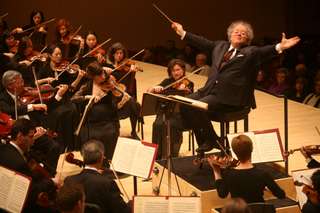|
Back
With a Whimper New York
Carnegie Hall
05/21/2009 -
Igor Stravinsky: Petrouchka
Johannes Brahms: Piano Concerto No. 1
Lang Lang (piano)
The Metropolitan Opera Orchestra, James Levine (conductor) 
James Levine (© Steven J. Sherman)
For his final concert with the Metropolitan Opera Orchestra this season, James Levine chose two works with very similar origins but very different destinies. Each was conceived by a young composer as his First Piano Concerto, each contrasting the more angular qualities of the keyboard with the rounded intonations of a string-dominated orchestra. But one of these concertos took a rather strange turn on its way to publication.
Igor Stravinsky abandoned the original conception of the music that would eventually see the light of day as Petrouchka once a commission inspired him to notice that his herky-jerky versus graceful dialogue was perfect as an emblem for the parallel worlds of the marionette and the mountebank. Thursday evening’s performance left much to be desired.
There was a rather distinctive hard edge to Mr. Levine’s conception, much of the warmth of the piece and a good deal of its distinct coloration, learned from the master Nicolai Rimsky-Korsakoff, presented in an unenthusiastic manner. This was not a terrible reading, but it was difficult to care a fig for the plight of the puppet under these monochromatic circumstances. The Met Orchestra, made up of many of the best soloists in New York, was uncharacteristically sloppy, the tuba player in the Shrovetide Fair section particularly culpable.
Attention to detail was also wanting, rather unusual for a Levine reading. Stravinsky writes that the death of Petrouchka should be sonically portrayed by the dropping of the tambourine to the floor, a brilliant aural combination of metallic jangle and wooden thud. However, in this tepid rendition, the percussionist simply tapped his instrument once in an oddly pococurante display. So much excitement could have emanated from that stage; instead this version was a big snooze.
There was a lively lobby debate among us critics at intermission as to whether Mr. Levine and his pianist, Lang Lang, would be in sync for the Brahms Concerto No. 1. If there were indeed a disagreement during rehearsal, apparently the man who advocated the duller approach won the argument.
Mr. Lang (or is it Mr. Lang?) managed to hit most, if not all, of the notes of this expansive concerto without allowing any rubato, dynamic contrast or poetic expression stand in the way of his declarative statement. The argument against him in the past was his reliance on histrionic physical gestures, but now that he has considerably cleaned up his act, it is difficult not to concentrate on his lack of soulful interpretation. This current exercise was neither elegant nor eloquent.
The sum total of Mr. Levine’s involvement was a rather worried stare at one point when Mr. Lang fell behind an entire measure, but the orchestra, sounding quite lovely to be sure, simply went through the motions rather than the emotions of the piece. Listening to great music is a complex and multi-layered process and much of this particular crowd, judging from their applause at the end of the first movement and their war-whooping at the work’s conclusion, was an unsophisticated one. Perhaps this was a sufficient effort for their initial foray into Brahms, but for those who expected something beyond a by the numbers experience – and paid well over one hundred dollars to hear it, the Carnegie Hall season ended on a sour note.
Fred Kirshnit
|